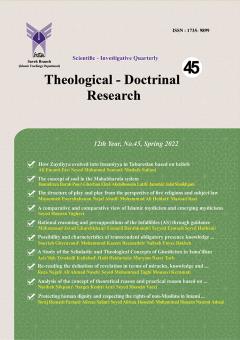Analysis of the concept of theoretical reason and practical reason based on Islamic approach
Subject Areas : کلام اسلامیNasibeh Nikpoor 1 , Narges Keshtiaray 2 * , hosein vaezi 3
1 -
2 -
3 -
Keywords: Reason, theoretical reason, practical reason, Islamic approach.,
Abstract :
Theoretical intellect and practical intellect in the context of history in Islam have great value and credibility. According to the Islamic approach and analysis of the thoughts of Islamic philosophers, it is concluded that each of them has addressed this issue from a specific perspective. Therefore, explaining the views of some of these contemporary and non-contemporary Islamic thinkers on theoretical and practical reason is of particular importance. In this article, a descriptive analytical method has been tried to briefly address his thoughts. The results of this article show that they have considered theoretical and practical reason from two perspectives and in this agreement they consider theoretical reason in four levels: monster, queen, actual, and utilitarian. They consider the perception of generalities as one of its functions and divide practical reason into four levels of manifestation, emptying, emptying, and annihilation. . Their differences are in the perception of concepts in general and in particular and the relationship between theoretical and practical reason.
اعلائی،غلام¬حسین .( 1391) . تحلیل معرفت عقلانی مطرح شده در آیات قرآن کریم (بر اساس تفسیر المیزان) و دلالت¬های تربیتی آن بر برنامۀ درسی، پایانامه دکتری دانشگاه آزاد خوراسگان.
خیر اللهی، زهرا. (1390) . ماهیت عقل و توانایی آن در امر شناخت، پژوهش-های فلسفی- کلامی،13(2): 149-175 .
هدایتی محمد¬علی،شمالی محمد.( 1388 ). جستاری در عقل نظری و عقل عملی، معرفت فلسفی،6(3): 262-213.
شیبانی، محمد. ( 1388). کارکرد های عقل نظری و عملی از نگاه ابن سینا،پژوهش¬های فلسفی و کلامی، 11(2): 273-257.
مظاهری، مهدی؛ نوروزی، رضا علی؛ نجفی، محمد.( 1388). بایسته¬ها و پیامد-های تربیتی عقل نظری و مراتب آن در فلسفۀ ملاصدرا، تعلیم و تربیت اسلامی،17 (78) : 28-9.
بهشتی، سعید.(1380). آیین خرد پروری؛ پژوهشی در نظام تربیت عقلانی بر مبنای سخنان امام علی، تهران: مؤسسۀ فرهنگی دانش و اندیشۀ معاصر.
الهی، فاطمه؛ مهدوی¬نژاد، علی؛ دلشاد-تهرانی، مصطفی.( 1394). جايگاه عقل در معرفت ديني از نگاه امام علي(ع)، پژوهشنامۀ علوی،6 (2) :1-27.
قربانی گلشن¬آبادی، محمد.( 1389) . جایگاه عقل در اندیشه¬ سیاسی حضرت امام خمینی(ره)، کنگره ملی بررسی اندیشه¬های فرهنگی و اجتماعی حضرت امام خمینی(ره).
اصلانی یاسر. 1389. روش¬های تربیت عقلانی بر اندیشۀ امام خمینی(ره)، دانشور،1 (42): 148-129.
احمدی، حسین؛ مدرسی، محمد¬رضا.(1395). بررسی دیدگاه¬ آیت¬الله جوادی آملی در مسئلۀ باید و نباید، پژوهش¬نامه اخلاق، 9 (32) :120-105.
رضایی، محمد جعفر؛ نوروزی، رضا¬علی؛ سپاهی، مجتبی.(1393). غایت شناسی تربیت عقلانی در ساحت فردي از دیدگاه آیت الله جوادي آملی، پژوهش در مسائل تعلیم و تربیت اسلامی، 22( 25): 39-57.
ذولحسنی، فرزانه.(1393). جایگاه معرفت شناختی عقل عملی نزد ابن سینا، حکمت سینوی(مشکوت النور)، 11(35 ): 5-17.

